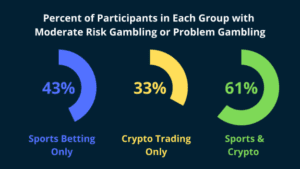Tuesday, November 02, 2021
Read the original article from The Wager Here.
By: Caitlyn Fong
Cryptocurrency, or “crypto”, is a digital currency that can be used to buy goods and services, or be traded for profit, with similarities with day trading on the stock market. Day trading itself is similar to gambling in some ways, and many day traders are also heavy bettors. Crypto trading is emerging as a similarly risky gambling-like activity. This week, The WAGER reviews a study by Paul Delfabbro and colleagues that investigated the gambling and stock trading habits of sports bettors, cryptocurrency traders, and people who do both.
What was the research question?
How do gambling habits, problem gambling rates, and prevalence of stock trading differ between sports bettors, crypto traders, and people who do both?
What did the researchers do?
The researchers surveyed 543 participants who reported gambling on sports or trading cryptocurrency at least once per month during the previous year. An international sample was recruited from the online platform Prolific and participants answered questions related to their gambling habits, crypto trading, and stock trading. Participants also completed the Problem Gambling Severity Index (PGSI). Then, the researchers compared three groups of participants: (1) those who only gambled on sports, (2) those who only traded cryptocurrency, and (3) those who did both.
What did they find?
Individuals who reported both crypto trading and sports wagering were more likely to have engaged in casino card games, race betting, and slots than those who reported either crypto trading or sports betting. Compared to sports bettors and those who did both, participants who only traded cryptocurrencies were less likely to gamble on all activities. The cryptocurrency-only group also had the lowest rates of moderate risk and problem gambling. Individuals who engaged in both crypto trading and sports wagering had significantly higher rates of moderate risk and problem gambling compared to sports bettors (see Figure). Importantly, however, 9.5% of the cryptocurrency-only group scored above the threshold for problem gambling on the PGSI, which is higher than the general population estimate of 0.5-2.0%. Stock trading was most likely to be reported by those who both traded cryptocurrency and wagered on sports.

Figure. Comparing the percent of participants in each group based on activities engaged in at least once per month during the past year whose PGSI score indicated moderate risk gambling or problem gambling. The difference between groups was statistically significant. Click image to enlarge.
Why do these findings matter?
The results show that crypto trading on its own is associated with increased problem gambling risk. Trading cryptocurrency also appears to amplify the risk of gambling alone, with those engaging in both activities most likely to experience gambling-related problems. Additionally, researchers have raised concerns that crypto trading has addictive qualities. Trading cryptocurrency is popular among gamblers, and should be incorporated into problem gambling screening and assessment protocols.
Every study has limitations. What are the limitations in this study?
This study was cross-sectional, so we cannot conclude whether trading cryptocurrency causes an increased risk for problem gambling or whether those already experiencing problem gambling have a greater inclination to engage in crypto trading. The study also relied on self-reported data, so participants might have under- or over-reported their actual gambling and/or crypto-related behaviors.
For more information:
Do you think you or someone you know has a gambling problem? Visit the National Council on Problem Gambling for screening tools and resources.
— Caitlyn Fong, MPH

